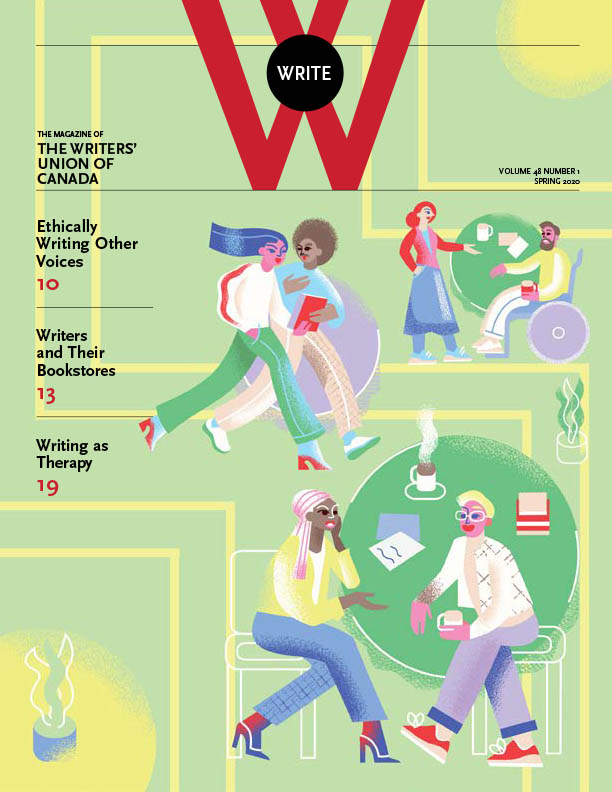– BY LI ROBBINS
Write | THE MAGAZINE OF THE WRITERS’ UNION OF CANADA

When I was a kid, my parents, avid readers, talked about opening up a bookstore in a small prairie town. The town was best known for car shows, power tobogganing, and a failing newspaper — possibly not the ideal marketplace. But many book lovers will relate. To be surrounded by books, talk books, make a living from books? The dream.
Among those book lovers are, of course, writers. Still, given the typical requirements of the writing life (solitude; more solitude) you might think the dream would begin and end there. Surprisingly, it has not. At least, not for the half dozen Canadian writer-slash-bookstore owners who shared their thoughts with Write on the feasibility of being writers who retail.
Novelist Michelle Berry, owner of Hunter Street Books in Peterborough, Ontario, was the one writer interviewed for this piece who didn’t, in fact, start with “the dream.” Her motivation was based on something more down-to-earth: she wanted to get out of the house. Publishing, she knew. Espresso-making, she didn’t. So, opening a bookstore made more sense than opening, say, a café.
“I was tired of teaching online,” Berry recalls, “of not getting out and seeing people, of writing in solitude, and so I thought, why not? I had no idea how difficult it would be. And how lifechanging. And how fun. And exhausting.”
“I had no idea how difficult it would be. And how life-changing. And how fun. And exhausting.”
Perhaps because opening a bookstore wasn’t a fantasy of Berry’s, the reality has proven to hold few disappointments. “It’s lived up to what I wanted it to be,” she says, “and that’s something that’s changing and growing every day. Something that, so far, excites me.” Today, Hunter Street Books, with its pride of place in Peterborough’s small but vital café district, is part of the city’s cultural fabric. “I feel a sense of pride that my vision has connected to Peterborough,” says Berry, “and that there are other readers out there who support what I’m trying to do. It’s been an amazing three years so far.”
BUILDING COMMUNITY
Bookstore as community and cultural hub is definitely part of the dream dreamed by Jason Purcell and Matthew Stepanic, poets and owners of Glass Bookshop in Edmonton, Alberta. The store currently operates as a pop-up, but the plan is to move into a permanent location later this year, one that’s in the vicinity of a number of Edmonton arts organizations.
“We saw the need for another community space to promote marginalized writers, smaller publishers, and host events that were accessible to everyone in the community,” say Purcell and Stepanic jointly by email. “We’re delighted that our pop-up has already captured the welcoming atmosphere central in our conception and planning. It’s also gratifying to hear customers notice our unique selection and the ways in which we prioritize queer, BIPOC, and other marginalized writers.”
Whether premeditated or not, an independent bookstore is perfectly situated to create, shape, and respond to community. The question is, what kind of community, and how do you go about building it? Novelist JoAnn McCaig expected her dream bookstore to be a home for literary events. But when she opened Shelf Life Books in Calgary, Alberta, in 2010, she wasn’t sure how to wrangle the writers. She needn’t have worried; people literally came knocking.
“One writer knocked on the window when we were still renovating and weeks from opening. She said, ‘When you get the store open, can I launch my new book here?’” says McCaig. “We’ve never looked back.”
DOING THE DISHES
At its busiest, Shelf Life now hosts three or four events a week. McCaig enjoys the excitement and celebratory atmosphere events create, although she admits she didn’t anticipate quite so many dirty dishes. (Not to mention “grocery shopping, arranging crackers on cheese trays, making coffee, and loading the dishwasher.”) She’s also had to reckon with her own degree of interest (or lack thereof) in the actual business of running a business.
“I’m not a retailer at heart,” says McCaig. “At an event, I’d be standing up front, welcoming the author and the audience and saying ‘Oh, isn’t this great, isn’t this wonderful?’ and my business partner Will [Lawrence] would stage whisper from the back, ‘Remind them to buy books!’”
For some, partners are definitely essential to the enterprise. The owners of Lexicon Books in Lunenburg, Nova Scotia — poet Alice Burdick, YA novelist Jo Treggiari, and children’s book enthusiast Anne-Marie Sheppard — suspected as much when they opened their store in 2015.
“The partnership is a very sensible way of organizing the business,” says Burdick. “We three all do different things, but there’s a lot of overlap too. We’re the primary employees as well as being the bookstore owners, so we know exactly how the store is operating at all times.”
Burdick adds that as “mothers and single parents” there’s also a shared understanding of how to balance the demands of the bookstore with the rest of life. But, despite the clear-headedness with which the trio entered the market, Treggiari says initially the response to their plan was doubt.
However, Treggiari says that “independent bookstores had already been on the rise again in the U.S., so we knew it was only a matter of time in Canada. People like to shop in welcoming places with knowledgeable and enthusiastic staff.”
“Not only are print book sales steadily on the rise, but most independent bookstores in Canada are profitable.”
Purcell and Stepanic concur, noting that the market research they did prior to opening Glass Bookshop showed that “not only are print book sales steadily on the rise but that most independent bookstores in Canada are profitable.”
Of course, that doesn’t mean that running a bookstore is a path to untold riches. Or to riches, period. However, for some in this group of writer-owners, it has meant a more consistent income stream than what Purcell and Stepanic characterize as the “feastor-famine” freelance lifestyle. Still, what of that matter of writing, now squeezed in between bank statements, boxes, and dishes?
TRYING TO WRITE
Purcell and Stepanic, still in the thick of early days, acknowledge that getting a business up and running means less time (and mental energy) to write, but say they hope to eventually find a “new way” to balance their writing projects. Sadly, anecdotal evidence to support the likelihood of reaching this goal appears to be thin on the ground. Although JoAnn McCaig offers a note of hope — after nearly a decade of running Shelf Life, and with considerable help from her “hardworking and capable staff,” she’s found both time to write and a publisher for her new, recently released novel.
So, something to aspire to. Meanwhile, Michelle Berry notes that “actual full writing days are few,” saying that even when wintry storms empty out the store for hours at a time, there are still the boxes, the accounts, the inventory, the books, the payroll, and the general “blah blah blah” that needs doing. Jo Treggiari shares a similar story, saying her dream of “sleepy cozy days writing on my laptop in the bookstore haven’t really panned out.” For her, writing continues to be chiselled out of “home time and kid time.”
But owning a bookstore still beats plenty of other ways of paying the bills, says Burdick. Greater responsibility, yes, but also greater satisfaction, derived in no small part from supporting other living authors. Bonus: For Burdick the constant supply of books in all genres has had a positive impact on her work, helping her to stretch as a writer. Being surrounded by books really can be fuel for one’s own fire, or, as Treggiari puts it, “Creativity in others inspires creativity in yourself.”
Of course, running a bookstore isn’t only about a) the daily slog, b) the quest for writing time, or c) turning to your wares as a source of creative inspiration. There’s also d), those people on the other side of the cash register. And, as anyone who’s ever worked in retail knows, customers can be a challenge. Berry jokes, “Sometimes running a bookstore is like being a psychotherapist.” But she’s also quick to add that more often than not her customers are “fun and interesting and kind and informative” and, ultimately, a source of inspiration. Her peers in the biz without exception share that sentiment. Bonus: Not only is owning a bookstore a direct conduit to the book-loving-andbuying public, it’s also a straight shot to the publishing industry itself.
“The more we interact with publishers, organizations, and individual authors,” say Purcell and Stepanic, “the greater sense we have of what is happening in Canada’s literary landscape and how we can best respond to it, in the bookshop and in our own work as writers.”
So, writers with the dream, don’t give up. For one thing, reports of the death of the independent bookstore have turned out to be greatly exaggerated. For another, it’s clear that being a writerbookseller may have both financial and creative rewards. And, for any home-office-based writer who feels isolated (i.e., most writers), one thing is for sure: Owning a bookstore really will get you out of the house.
Li Robbins is a freelance writer based in Peterborough, Ontario. Her work has appeared in The Globe and Mail, Toronto Star, The Walrus, Toronto Life, and on CBC.ca among other publications and websites. She was the communications director for the Writers’ Guild of Canada from 2013 to 2018 and prior to that worked as a CBC website and radio producer. She plans to tweet more frequently in future @LiRobbins.
Editor’s Note: The Winter 2017 issue of Write ran several stories on bookstores in Canada, including Hunter Street Books and Lexicon Books. We are happy to say that, at time of writing, these bookstores have weathered the gloomy forecast caused by the rise of digital media and are thriving as independents.
